
 |
||||||
|
GAY
FILM REVIEWS BY MICHAEL D. KLEMM
|
||||||
|
The Boys In The Band CBS/Paramount Director: Screenplay: Starring: Rated R, 119 minutes |
The
Boys Are Back
Once upon a time, gay men were always portrayed onstage and in the movies as prancing stereotypes that provoked ridicule. In 1968, the year before the Stonewall riots, Mart Crowley's The Boys in the Band premiered off-Broadway. It was groundbreaking in its day, and Clive Barnes in The New York Times called it "the frankest treatment of homosexuality I have ever seen on the stage." In 1970, it became a movie, directed by William Friedkin, with its original cast intact. For its 40th anniversary, it is making its long-awaited debut on DVD. |
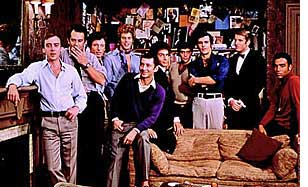 A
group of thirty-something gay men gather to celebrate their friend Harold's
birthday. Michael (Kenneth Nelson) is an angry and self-loathing alcoholic
who lights candles at midnight Mass and wishes that he wasn't gay. Swapping
tales about analysts with his friend, Donald (Frederick Combs), he announces
that he hasn't had a drink in five weeks. His new sobriety, however, will
soon be history. The guests arrive. Hank (Laurence Luckinbill) is quarreling
with his partner Larry (Keith Prentice). Their lover's spat escalates when
Hank realizes that Larry and Donald know each other from meeting in the
baths. Rounding out the soiree are the flamboyant Emory (Cliff Gorman),
a man of color named Bernard (Reuben Greene), and a brainless, young hustler
in cowboy attire (Robert La Tourneaux) who is Harold's birthday present. A
group of thirty-something gay men gather to celebrate their friend Harold's
birthday. Michael (Kenneth Nelson) is an angry and self-loathing alcoholic
who lights candles at midnight Mass and wishes that he wasn't gay. Swapping
tales about analysts with his friend, Donald (Frederick Combs), he announces
that he hasn't had a drink in five weeks. His new sobriety, however, will
soon be history. The guests arrive. Hank (Laurence Luckinbill) is quarreling
with his partner Larry (Keith Prentice). Their lover's spat escalates when
Hank realizes that Larry and Donald know each other from meeting in the
baths. Rounding out the soiree are the flamboyant Emory (Cliff Gorman),
a man of color named Bernard (Reuben Greene), and a brainless, young hustler
in cowboy attire (Robert La Tourneaux) who is Harold's birthday present.
|
|
|
|
|
|
|
|
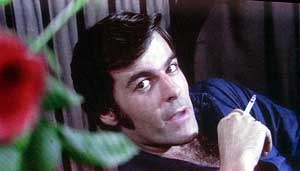 For
better or for worse, almost every gay plot we have seen for the last four
decades has its genesis here. Themes include coming out issues, passing
for straight, the unrequited love for a straight friend, the man who leaves
his wife when he finally accepts the truth about himself (I'm talking about
Hank here as we never find out for sure about Alan), and the "Christ, was
I drunk last night syndrome." There are numerous theatre jokes ("You have
just eaten Sebastian Venable"), bitchy one-liners, and Bette Davis imitations.
Emory, whom Alan calls "a butterfly in heat," fulfills the uber-queen role
who gets most of the laughs, and Michael is the quintessential self-hating
queer. For
better or for worse, almost every gay plot we have seen for the last four
decades has its genesis here. Themes include coming out issues, passing
for straight, the unrequited love for a straight friend, the man who leaves
his wife when he finally accepts the truth about himself (I'm talking about
Hank here as we never find out for sure about Alan), and the "Christ, was
I drunk last night syndrome." There are numerous theatre jokes ("You have
just eaten Sebastian Venable"), bitchy one-liners, and Bette Davis imitations.
Emory, whom Alan calls "a butterfly in heat," fulfills the uber-queen role
who gets most of the laughs, and Michael is the quintessential self-hating
queer. |
|
|
Seeing Boys today can be a tad schizophrenic. The Boys in the Band is a sympathetic portrait but what is one to make of the self-loathing that permeates this seminal work? Take, for example, Harold's famous speech to Michael:
Today's more permissive climate has made The Boys in the Band controversial. My partner calls it a minstrel show. I prefer to think of it as a period piece; like a Merchant-Ivory film that depicts the old aristocracy in all its glorious and outdated snobbery. The Boys in the Band is a savage comedic drama that undoubtedly was a mask for the playwright's own inner pain. Yes, they whine too much, but it is a fair and honest depiction of a time when police harassment was common and gay men usually offed themselves at the end of movies. Try to forget political correctness. Do you really expect Crowley's characters to be well adjusted and happy? |
|
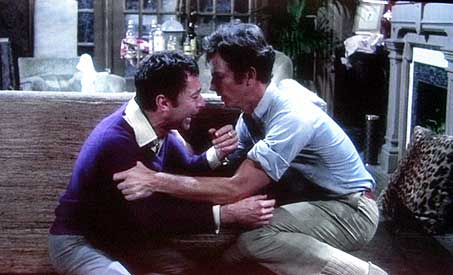 |
|
|
The script contains my favorite, and my most loathed, line of gay dialogue ever written. The loathed? "Show me a happy homosexual and I'll show you a gay corpse." And my favorite? "Who do you have to fuck to get a drink around here?" The principals deliver the goods with bite and wit. Anyone who relishes verbal sparring will find the bon mots in Boys delicious. Words become finely honed weapons. The boys lash out at each other with the same fervor as the society that threatens to annihilate them. At times, the bitch-fest gets out of control yet each is granted at least one moment of quiet dignity. "I may be nellie," Emery remarks, "But I'm no coward." Most touching is when Larry and Hank reconcile their differences and profess their love. Michael's panicked collapse at the end still packs an emotional wallop. |
|
|
Dost the ladies protest too much? This point can be debated for years. Younger gay viewers who grew up with Ellen and Will And Grace, and watched the proud boys of Liberty Avenue strut their stuff on Showtime's Queer as Folk, can forget that most gay men once had to hide in a closet. Michael's remark that they shouldn't hate themselves so much would be echoed again in Terrence NcNally's Love! Valour! Compassion! more than two decades later. Yes, most of them whine too much. Yes, they can be a superficial bunch. Yes, Michael and Harold are too obsessed with make-up and designer clothes. Yes, Michael is a super bitch and a racist. But, for all their faults, there is still an unmistakable camaraderie. After Harold's scathing rebuke of Michael at the end, he also tells him that he will call tomorrow. Whatever one thinks of the histrionics, The Boys In The Band is a masterfully written play that spoke to, and can still speak to, generations of gay men. There might be a hell of a lot more gay pride today but, watching it, one painfully realizes that, in 40 years, some things still haven't changed. |
|
| MORE BACKGROUND INFORMATION | |
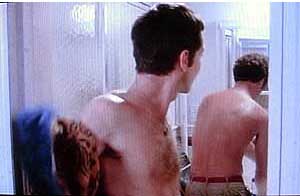 It
is important to note that The Boys in the Band
dealt with gay topics as a time when no one else was doing so. It's
not that gay men and women never existed in plays before; look at the oeuvre
of Tennessee Williams. But most plays usually dealt more with the subject
as a "dirty little secret." Citing Williams again, most of his gay characters
are dead before the play even begins. As for the boy in Robert Anderson's
Tea And Sympathy, he wasn't really gay he was just "sensitive." While
it was common knowledge that many of the great playwrights, directors and
choreographers were gay (not to mention a good chunk of the actors), there
was still rampant homophobia amongst mainstream theatre critics in the early
60s. Some of them picked up on the codes "hidden" in many plays of the era
and were not amused. Edward Albee was often a target; his Who's Afraid
of Virginia Woolf? was attacked for being a mockery of heterosexual
marriage or, even worse, really being about two bitchy gay couples
disguised as straight. In spite of this, however, Boys
got mostly good reviews after it opened. Cliff Gorman even won an Obie award
for his role as Emory. It
is important to note that The Boys in the Band
dealt with gay topics as a time when no one else was doing so. It's
not that gay men and women never existed in plays before; look at the oeuvre
of Tennessee Williams. But most plays usually dealt more with the subject
as a "dirty little secret." Citing Williams again, most of his gay characters
are dead before the play even begins. As for the boy in Robert Anderson's
Tea And Sympathy, he wasn't really gay he was just "sensitive." While
it was common knowledge that many of the great playwrights, directors and
choreographers were gay (not to mention a good chunk of the actors), there
was still rampant homophobia amongst mainstream theatre critics in the early
60s. Some of them picked up on the codes "hidden" in many plays of the era
and were not amused. Edward Albee was often a target; his Who's Afraid
of Virginia Woolf? was attacked for being a mockery of heterosexual
marriage or, even worse, really being about two bitchy gay couples
disguised as straight. In spite of this, however, Boys
got mostly good reviews after it opened. Cliff Gorman even won an Obie award
for his role as Emory. |
|
|
Commentators in 1970 usually emphasized Emory's antics and Harold's acid tongue while failing to note the very moving story of Larry and Hank and their differing views on monogamy vs. an open relationship. Straight reviewers in 1970 probably felt the most threatened by them because they are truly in love while being the least outrageous characters of the bunch and the most "straight acting." It's a case of life imitating art as the play's Alan also cannot accept the seemingly "normal" Hank being in love with another man. |
|
|
There is a charming anecdote in Boze Hadleigh's book, The Lavender Screen, attributed to actor Frederick Combs. He was playing Donald again in the London production when he heard, through a friend, that Princess Margaret told her guests at a royal dinner that she had just seen the most delightful play about homosexuals and then asked if anyone knew what "rimming a snowman" meant. |
|
| FILMING THE PLAY | |
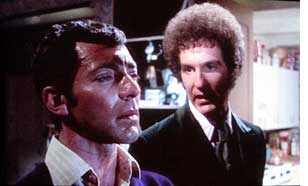 Playwright
Mart Crowley comments on the DVD that he turned down offers from Hollywood
to film the movie with established stars. He insisted on writing the screenplay
himself, and keeping the original cast and director. The actors in The
Boys In The Band were noted stage players; Kenneth Nelson
(Michael) was in the original production of The Fantasticks. But
because they had only worked on stage, the studio wanted someone on the
set who knew how to direct a movie and so Crowley agreed to this concession
in order to win his other demands. This was a big deal; using the entire
original cast from a play was a rarity in Hollywood stage adaptations and
still is. I can think of few, if any, others. Elia Kazan almost succeeded
with A Streetcar Named Desire but the studio needed one name
on the marquee and Jessica Tandy was eighty-sixed so that Vivian Leigh could
star as Blanche. This was par for the course; even Chita Rivera was replaced
when West Side Story became a movie. A moment in history was preserved
by keeping the boys intact. Playwright
Mart Crowley comments on the DVD that he turned down offers from Hollywood
to film the movie with established stars. He insisted on writing the screenplay
himself, and keeping the original cast and director. The actors in The
Boys In The Band were noted stage players; Kenneth Nelson
(Michael) was in the original production of The Fantasticks. But
because they had only worked on stage, the studio wanted someone on the
set who knew how to direct a movie and so Crowley agreed to this concession
in order to win his other demands. This was a big deal; using the entire
original cast from a play was a rarity in Hollywood stage adaptations and
still is. I can think of few, if any, others. Elia Kazan almost succeeded
with A Streetcar Named Desire but the studio needed one name
on the marquee and Jessica Tandy was eighty-sixed so that Vivian Leigh could
star as Blanche. This was par for the course; even Chita Rivera was replaced
when West Side Story became a movie. A moment in history was preserved
by keeping the boys intact. |
|
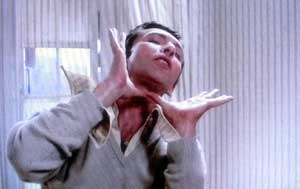 As
noted earlier, William Friedkin was selected to direct because of his ability
to render Harold Pinter onscreen. In his commentary on the DVD, we learn
that he saw the play and couldn't dream of replacing any of the actors either.
He is sincere in his admiration for Crowley's script and his desire to do
justice to such a groundbreaking work. He recalls going to Fire Island with
Crowley and watching how gay men partied, and describes his creative process
in translating the play into cinema. He goes to great pains to explain how
bad the closet was in the 60s and salutes the courage of The
Boys in the Band's actors. Strangely, he never bothered to
find out which of them were actually gay and thought it was unimportant;
he just considered each of them to be perfect in their parts. As
noted earlier, William Friedkin was selected to direct because of his ability
to render Harold Pinter onscreen. In his commentary on the DVD, we learn
that he saw the play and couldn't dream of replacing any of the actors either.
He is sincere in his admiration for Crowley's script and his desire to do
justice to such a groundbreaking work. He recalls going to Fire Island with
Crowley and watching how gay men partied, and describes his creative process
in translating the play into cinema. He goes to great pains to explain how
bad the closet was in the 60s and salutes the courage of The
Boys in the Band's actors. Strangely, he never bothered to
find out which of them were actually gay and thought it was unimportant;
he just considered each of them to be perfect in their parts. |
|
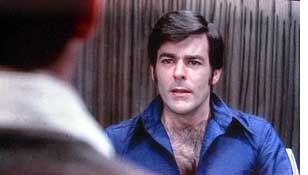 In
many ways, he was the ideal director. He enjoyed the challenge of working
on a single set ala Hitchcock's Rear Window and, aside from the montage
of New York scenes in the beginning, resisted the urge to "open up" the
play. Friedkin would block the actors in ways that were true to its stage
roots while being cinematic at the same time. For the most part, Boys
does not look like filmed theatre, and it moves at a good pace. But, as
I said earlier, I have issues with some of his other directorial decisions
- especially that pointless thunderstorm. I also feel that certain characters
and incidents sometimes do not always get the emphasis that they should
in the camera set-ups. The shot when Michael downs his first drink needed
to be held for much longer and its impact isn't want it could have been.
Harold has one of the greatest entrances in modern theatre, and he certainly
does here too, but why does the first shot of his face have to be
an extreme close-up that resembles the introduction of the monster in James
Whale's Frankenstein? In
many ways, he was the ideal director. He enjoyed the challenge of working
on a single set ala Hitchcock's Rear Window and, aside from the montage
of New York scenes in the beginning, resisted the urge to "open up" the
play. Friedkin would block the actors in ways that were true to its stage
roots while being cinematic at the same time. For the most part, Boys
does not look like filmed theatre, and it moves at a good pace. But, as
I said earlier, I have issues with some of his other directorial decisions
- especially that pointless thunderstorm. I also feel that certain characters
and incidents sometimes do not always get the emphasis that they should
in the camera set-ups. The shot when Michael downs his first drink needed
to be held for much longer and its impact isn't want it could have been.
Harold has one of the greatest entrances in modern theatre, and he certainly
does here too, but why does the first shot of his face have to be
an extreme close-up that resembles the introduction of the monster in James
Whale's Frankenstein? |
|
| THE
DVD The remastered DVD looks terrific. The film was restored using a new digitally cleaned-up and color-timed print. The final transfer was achieved by overlaying an oversaturated copy over a black and white dupe and the result was a DVD that looks better than any print of the film in existence. Fans of the film are in for a treat. |
|
|
Whether you love The Boys in the Band or hate it, this new DVD is a must for any serious student of queer cinema. |
|
| SOME
LAST THOUGHTS: WHAT ABOUT ALAN? A play or a film that lends itself to multiple interpretations can be far more interesting than one that wraps up everything in a bow at the end. One of the big questions that audiences of The Boys In The Band have debated for decades is Alan's ambiguous sexuality. What is the real reason that he called Michael and wanted so desperately to speak with him? This last section is for readers who have already seen The Boys In The Band; major spoilers are ahead... |
|
|
When Alan arrives at the party, he is shocked to find what he perceives to be a pile of flaming queens dancing. He is drawn to the "straightest acting" man at the party, Hank. Ironically, we later learn that Hank's situation mirrors Alan's. Although he doesn't reveal this to Alan until later, Hank is getting a divorce from his wife because he has finally stopped lying to himself; he tried to change but it didn't work. Is Alan facing the same dilemma? When Alan speaks with Michael alone, he innocuously remarks that Hank is a "very attractive fellow." This is not something a straight man would normally say. |
|
|
Finally, Michael calls Alan a closet queen and accuses him of sleeping with another college friend, Justin Stuart. Michael claims that Justin told him this himself and Alan denies it, stating that he broke off their friendship when Justin professed his love. This has echoes of Brick and Skipper in Tennessee Williams' Cat On A Hot Tin Roof. Michael hands Alan the phone and orders him to call Justin and tell him that he loves him. As the others watch, Alan takes the telephone but he calls his wife instead. It is a devastatingly dramatic scene. Michael is humiliated and Alan cryptically thanks him as he exits the apartment. |
|
|
Friedkin, in his commentary, is convinced that Alan was not gay. Michael, he explains, had once dated Alan's wife and so he is the logical person to call because the three of them knew one another. But Friedkin is straight, most gay men will probably think the opposite. Is Alan secretly gay but will never admit it to himself? Was Alan lying when he denied sleeping with Justin? Either answer works. The play and the film never answer this question definitively and it is this ambiguity that is part of The Boys In The Band's intrigue. This particular plot device has been recycled repeatedly in the decades that followed. Despite all the reviled self-loathing, Crowley's opus is really not as dated as many insist. LOCALLY
ON STAGE...AND A PERSONAL REMEMBRANCE I then rented the film on VHS and found that I actually preferred BUA's staged reading. Five years later, in 2002, when BUA re-mounted the play in a full production, I had a conversation with actor Chris Kelly (who played Michael), in which Chris called the film "deadly" and said that they were going to make it less funereal. (I'm not sure about "deadly" but I agree that the film is often too dark - once again, that thunderstorm!) Javier directed again and he had a great cast which included a superb Eric Rawski as Donald, Tim Finnegan and Brett Runyan as Hank and Larry, and Jimmy Janowski, whose performance as Harold was one for the ages. He delivered that line about "rimming a snowman" with far more panache than Leonard Frey did. BUA first staged it in 1993, which means that their local production actually pre-dated the first New York City revival by three years!!! One of the great things about Buffalo is that we have almost twenty professional theatre companies and BUA has introduced playgoers here to some edgy stuff over the years, including The Laramie Project, the plays of Brad Fraser, and the first productions outside of NYC of Terrence McNally's Love! Valour! Compassion! and Some Men. My hats off to the company. Who says that Buffalo isn't hip?
More
On William Friedkin: |